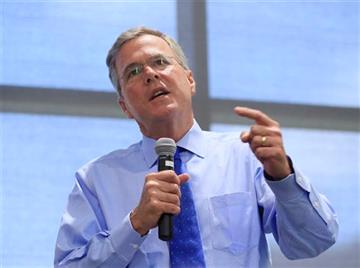By THOMAS BEAUMONT and CATHERINE LUCEY
Associated Press
WASHINGTON, Iowa (AP) — Jeb Bush cautioned against blending politics and religion Wednesday, signaling he will not necessarily heed the pope or pander to social conservatives on policy in his campaign for the Republican nomination.
“I don’t think we should politicize our faith,” he said, speaking in a state where evangelical Christians wield significant political influence. “I think religion ought to be about making us better as people and less about things that end up getting into the political realm.”
His comments came on the eve of an encyclical by Pope Francis that is expected to endorse the scientific view that human activity contributes to climate change — a conclusion challenged by many Republicans and several of the party’s candidates for president.
Bush, who converted to Catholicism, suggested he will not be beholden to a faith-driven policy agenda wherever it comes from because his religion is a personal beacon, not a political roadmap.
“I go to church to have my faith nourished, to have my faith challenged,” the former Florida governor told reporters after the outdoor meeting with about 75 eastern Iowa Republicans in the backyard of a local supporter. “That’s why I go to Mass. I don’t go to Mass for economic policy or for things in politics.”
On the coming encyclical, he said he would read and reflect on it. “I think Pope Francis is an extraordinary leader of a church whose teachings I try to follow, and it doesn’t need to get any more complicated than that,” Bush said. “But I think it’s better to solve this in the political realm.”
Bush has said he accepts the scientific premise that the climate is changing and believes that examining the causes should be a priority. But he’s contended that the science is not clear on how much global warming comes from human activity.
Bush, on his first visit to Iowa as a declared candidate, was asked at a public event what he would do to put God in public life. He sidestepped somewhat, saying he would more broadly promote the defense of religious liberty. “The next president needs to establish religious freedom as one of the first freedoms,” he said.
Daniel Wright, a 32-year-old electronics salesman from eastern Iowa, said Bush was unafraid of the question, which impressed him, but he felt he dodged it.
“Specifically, I was talking about God, not religion collectively, from a Christian point of view,” Wright said. “I would have loved to have kept the question on God and not religion as a whole.”
It was a rapid introduction to Iowa caucus politics for Bush, whose positions on immigration and education have raised questions among some on the right about whether he’s conservative enough. He’s been reaching out to influential Christian conservatives for months but has spent less time in Iowa than some other leading rivals.
Iowa Christian conservative groups have already held gatherings for activists where presidential prospects have spoken, though Bush has not. Some candidates also aggressively court pastors, who can be influential among parishioners, especially in evangelically conservative northwest Iowa. It’s a segment of Republican primary voters that is also influential in parts of South Carolina, where Bush travels Thursday.
At least eight candidates have confirmed they plan to participate in the July conference of the Iowa Family Leader, a Christian-based policy group. Bush has not attended any such events, although he went to an Iowa agricultural policy conference and the Iowa Republican Party’s spring dinner last month. But he’s speaking Friday at a Faith & Freedom Coalition conference in Washington with some of his rivals.
The past two caucus winners were former Arkansas Gov. Mike Huckabee in 2008, and former Pennsylvania Sen. Rick Santorum in 2012, both of whom heavily courted evangelical Christians.
Copyright 2015 The Associated Press. All rights reserved. This material may not be published, broadcast, rewritten or redistributed.

